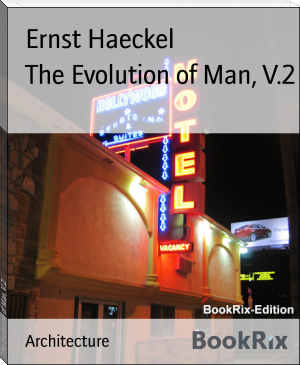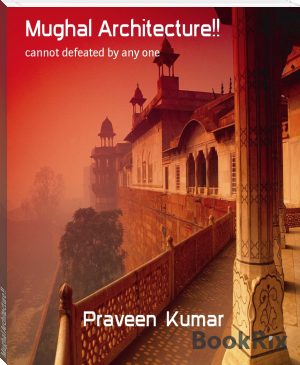The Brethren, H. Rider Haggard [ebooks that read to you .txt] 📗

- Author: H. Rider Haggard
Book online «The Brethren, H. Rider Haggard [ebooks that read to you .txt] 📗». Author H. Rider Haggard
"Where is the security that you will not do it if we are satisfied?" asked Wulf bluntly.
"You must take the word of a 'daughter of Al-je-bal.' I have none other to offer," she replied.
"That may mean death," said Wulf.
"You said just now that was not fated, and although I have sought your company for my own reasons, I have no quarrel with you--as yet. Choose your own path. Still, I tell you that if you go, who, chancing to know Arabic, have learned my secret, you die, and that if you stay you are safe--at least while you are in this house. I swear it on the token of Al-je-bal," and bending forward she touched the ring in Godwin's hand, "but remember that for the future I cannot answer."
Godwin and Wulf looked at each other. Then Godwin replied:
"I think that we will trust you, and stay," words at which she smiled a little as though she were pleased, then said:
"Now, if you wish to walk abroad, guests Peter and John, I will summon the slave to guide you, and in four days we will talk more of this matter of your journey, which, until then, had best be forgotten."
So the man came, armed with a sword, and led them out, clad in their pilgrims' robes, through the streets of this Eastern town, where everything was so strange, that for awhile they forgot their troubles in studying the new life about them. They noted, moreover, that though they went into quarters where no Franks were to be seen, and where fierce-looking servants of the Prophet stared at them sourly, the presence of this slave of Masouda seemed to be sufficient to protect them from affront, since on seeing him even the turbaned Saracens nudged each other and turned aside. In due course they came to the inn again, having met no one whom they knew, except two pilgrims who had been their fellow-passengers on the dromon. These men were astonished when they said that they had been through the Saracen quarter of the city, where, although this town was in the hands of the Christians, it was scarcely thought safe for Franks to venture without a strong guard.
When the brethren were back in their chamber, seated at the far end of it, and speaking very low, lest they should be overheard, they consulted together long and earnestly as to what they should do. This was clear--they and something of their mission were known, and doubtless notice of their coming would soon be given to the Sultan Saladin. From the king and great Christian lords in Jerusalem they could expect little help, since to give it might be to bring about an open rupture with Saladin, such as the Franks dreaded, and for which they were ill prepared. Indeed, if they went to them, it seemed likely that they would be prevented from stirring in this dangerous search for a woman who was the niece of Saladin, and for aught they knew thrown into prison, or shipped back to Europe. True, they might try to find their way to Damascus alone, but if the Sultan was warned of their coming, would he not cause them to be killed upon the road, or cast into some dungeon where they would languish out their lives? The more they spoke of these matters the more they were perplexed, till at length Godwin said:
"Brother, our uncle bade us earnestly to seek out this Al-je-bal, and though it seems that to do so is very dangerous, I think that we had best obey him who may have been given foresight at the last. When all paths are full of thorns what matter which you tread?"
"A good saying," answered Wulf. "I am weary of doubts and troublings. Let us follow our uncle's will, and visit this Old Man of the Mountains, to do which I think the widow Masouda is the woman to help us. If we die on that journey, well, at least we shall have done our best."
Chapter Nine(The Horses Flame and Smoke)
On the following morning, when they came into the eating-room of the inn, Godwin and Wulf found they were no longer alone in the house, for sundry other guests sat there partaking of their morning meal. Among them were a grave merchant of Damascus, another from Alexandria in Egypt, a man who seemed to be an Arab chief, a Jew of Jerusalem, and none other than the English trader Thomas of Ipswich, their fellow-passenger, who greeted them warmly.
Truly they seemed a strange and motley set of men. Considering them as the young and stately widow Masouda moved from one to the other, talking to each in turn while she attended to their wants, it came into Godwin's mind that they might be spies meeting there to gain or exchange information, or even to make report to their hostess, in whose pay perhaps they were. Still if so, of this they showed no sign. Indeed, for the most part they spoke in French, which all of them understood, on general matters, such as the heat of the weather, the price of transport animals or merchandise, and the cities whither they purposed to travel.
The trader Thomas, it appeared, had intended to start for Jerusalem that morning with his goods. But the riding mule he had bought proved to be lame from a prick in the hoof, nor were all his hired camels come down from the mountains, so that he must wait a few days, or so he said.
Under these circumstances, he offered the brethren his company in their ramblings about the town. This they thought it wise not to refuse, although they felt little confidence in the man, believing that it was he who had found out their story and true names and revealed them to Masouda, either through talkativeness or with a purpose.
However these things might be, this Thomas proved of service to them, since, although he was but just landed, he seemed to know all that had passed in Syria since he left it, and all that was passing then. Thus he told them how Guy of Lusignan had just made himself king in Jerusalem on the death of the child Baldwin, and how Raymond of Tripoli refused to acknowledge him and was about to be besieged in Tiberias. How Saladin also was gathering a great host at Damascus to make war upon the Christians, and many other things, false and true.
In his company, then, and sometimes in that of the other guests-- none of whom showed any curiosity concerning them, though whether this was from good manners or for other reasons they could not be sure--the brethren passed the hours profitably enough.
It was on the third morning of their stay that their hostess Masouda, with whom as yet they had no further private talk, asked them if they had not said that they wished to buy horses. On their answering "Yes," she added that she had told a certain man to bring two for them to look at, which were now in the stable beyond the garden. Thither they went, accompanied by Masouda, to find a grave Arab, wrapped in a garment of camel's hair and carrying a spear in his hand, standing at the door of the cave which served the purpose of a stable, as is common in the East where the heat is so great. As they advanced towards him, Masouda said:
"If you like the horses, leave me to bargain, and seem to understand nothing of my talk."
The Arab, who took no notice of them, saluted Masouda, and said to her in Arabic:
"Is it then for Franks that I have been ordered to bring the two priceless ones?"
"What is that to you, my Uncle, Son of the Sand?" she asked. "Let them be led forth that I may know whether they are those for which I sent."
The man turned and called into the door of the cave.
"Flame, come hither!" As he spoke, there was a sound of hoofs, and through the low archway leapt the most beautiful horse that ever their eyes had seen. It was grey in colour, with flowing mane and tail, and on its forehead was a black star; not over tall, but with a barrel-like shape of great strength, small-headed, large-eyed; wide-nostriled, big-boned, but fine beneath the knee, and round-hoofed. Out it sprang snorting; then seeing its master, the Arab, checked itself and stood still by him as though it had been turned to stone.
"Come hither, Smoke," called the Arab again, and another horse appeared and ranged itself by the first. In size and shape it was the same, but the colour was coal-black and the star upon its forehead white. Also the eye was more fiery.
"These are the horses," said the Arab, Masouda translating. "They are twins, seven years old and never backed until they were rising six, cast at a birth by the swiftest mare in Syria, and of a pedigree that can be counted for a hundred years."
"Horses indeed!" said Wulf. "Horses indeed! But what is the price of them?"
Masouda repeated the question in Arabic, whereon the man replied in the same tongue with a slight shrug of the shoulders.
"Be not foolish. You know this is no question of price, for they are beyond price. Say what you will."
"He says," said Masouda, "that it is a hundred gold pieces for the pair. Can you pay as much?"
The brethren looked at each other. The sum was large.
"Such horses have saved men's lives ere now," added Masouda, "and I do not think that I can ask him to take less, seeing that, did he but know it, in Jerusalem they could be sold for thrice as much. But if you wish, I could lend you money, since doubtless you have jewels or other articles of value you could give as security--that ring in your breast, for instance, Peter."
"We have the gold itself," answered Wulf, who would have paid to his last piece for those horses.
"They buy," said Masouda.
"They buy, but can they ride?" asked the Arab. "These horses are not for children or pilgrims. Unless they can ride well they shall not have them--no, not even if you ask it of me."
Godwin said that he thought so--at least, they would try. Then the Arab, leaving the horses standing there, went into the stable, and with the help of two of the inn servants, brought out bridles and saddles unlike any they had seen. They were but thickly-quilted pads stretching far back upon the horses' loins, with strong hide girths strapped with wool and chased stirrups fashioned like half hoofs. The bits also were only snaffles without curbs.
When all was ready and the stirrups had been let down to the length they desired, the Arab motioned to them to mount. As they prepared to do so, however, he spoke some word, and suddenly those meek, quiet horses were turned into two devils, which reared up on their hind legs and threatened them with their teeth and their front hoofs, that





Comments (0)